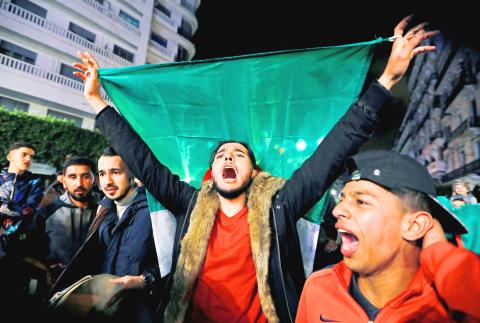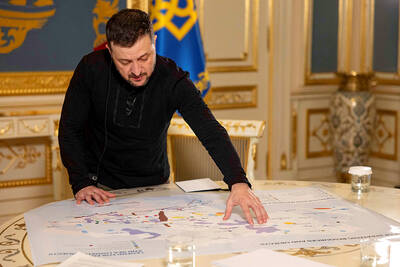Algeria’s president of two decades on Monday abandoned his bid for a fifth term following unprecedented protests over his fitness for office, but his simultaneous postponement of an election set for next month has critics worried that he intends to hold on to power.
Algerian President Abdelaziz Bouteflika, who has rarely been seen in public since he had a stroke in 2013 and just returned from a two-week hospital stay in Geneva, Switzerland, promised to establish a panel to plan a rescheduled vote and to put an interim government in place.
In a letter to the nation released by Algeria Press Service, 82-year-old Bouteflika stressed the importance of including Algeria’s disillusioned youth in the reform process and putting the country “in the hands of new generations.”

Photo: Reuters
However, for many of the protesters — students, lawyers and even judges — the most important sentence in the president’s letter read: “There will be no fifth term.”
Celebrations popped up instead of protests on the streets of the capital, Algiers, at the news. Car horns rang out while people waved flags, jumped up and down, and sang the national anthem.
Several thanked Bouteflika.
One described the development as a “real ray of sunshine.”
Others were more cautious, calling their long-time leader’s pledge to step aside just a first step.
Bouteflika did not give a date or timeline for the delayed election.
In the letter, he said that the “national conference” he would task with planning the vote would also be responsible for drafting a new constitution for Algeria.
He added that he would also name an interim government.
The changes were put in motion within hours.
Algerian Minister of the Interior Noureddine Bedoui, a Bouteflika loyalist, was made prime minister and charged with forming the new administration, the state news agency said.
Critics said that they fear the moves could pave the way for the president to install a handpicked successor.
Others saw his decision to postpone the election indefinitely as a threat to democracy in Algeria.
A wily political survivor, Bouteflika fought in Algeria’s independence war against French forces and has played a role in Algeria’s major developments over the past half-century.
He became president in 1999 and reconciled a nation riven by a deadly Muslim insurgency, but questions swirl over whether he is really running the country today.
The protests surprised Algeria’s opaque leadership and freed the country’s people, long fearful of a watchful security apparatus, to openly criticize the president.
Algerians have also expressed anger over corruption that put their country’s oil and gas riches in the hands of a few, while millions of young people struggle to find jobs.
The unprecedented citizens’ revolt drew millions into the streets of cities across the country to demand that Bouteflika abandon his candidacy.

Thousands gathered across New Zealand yesterday to celebrate the signing of the country’s founding document and some called for an end to government policies that critics say erode the rights promised to the indigenous Maori population. As the sun rose on the dawn service at Waitangi where the Treaty of Waitangi was first signed between the British Crown and Maori chiefs in 1840, some community leaders called on the government to honor promises made 185 years ago. The call was repeated at peaceful rallies that drew several hundred people later in the day. “This government is attacking tangata whenua [indigenous people] on all

RIGHTS FEARS: A protester said Beijing would use the embassy to catch and send Hong Kongers to China, while a lawmaker said Chinese agents had threatened Britons Hundreds of demonstrators on Saturday protested at a site earmarked for Beijing’s controversial new embassy in London over human rights and security concerns. The new embassy — if approved by the British government — would be the “biggest Chinese embassy in Europe,” one lawmaker said earlier. Protester Iona Boswell, a 40-year-old social worker, said there was “no need for a mega embassy here” and that she believed it would be used to facilitate the “harassment of dissidents.” China has for several years been trying to relocate its embassy, currently in the British capital’s upmarket Marylebone district, to the sprawling historic site in the

‘IMPOSSIBLE’: The authors of the study, which was published in an environment journal, said that the findings appeared grim, but that honesty is necessary for change Holding long-term global warming to 2°C — the fallback target of the Paris climate accord — is now “impossible,” according to a new analysis published by leading scientists. Led by renowned climatologist James Hansen, the paper appears in the journal Environment: Science and Policy for Sustainable Development and concludes that Earth’s climate is more sensitive to rising greenhouse gas emissions than previously thought. Compounding the crisis, Hansen and colleagues argued, is a recent decline in sunlight-blocking aerosol pollution from the shipping industry, which had been mitigating some of the warming. An ambitious climate change scenario outlined by the UN’s climate

BACK TO BATTLE: North Korean soldiers have returned to the front lines in Russia’s Kursk region after earlier reports that Moscow had withdrawn them following heavy losses Ukrainian President Volodymyr Zelenskiy on Friday pored over a once-classified map of vast deposits of rare earths and other critical minerals as part of a push to appeal to US President Donald Trump’s penchant for a deal. The US president, whose administration is pressing for a rapid end to Ukraine’s war with Russia, on Monday said he wanted Ukraine to supply the US with rare earths and other minerals in return for financially supporting its war effort. “If we are talking about a deal, then let’s do a deal, we are only for it,” Zelenskiy said, emphasizing Ukraine’s need for security guarantees